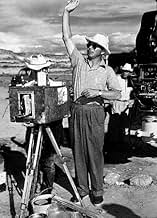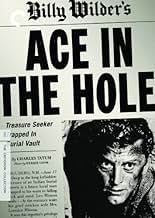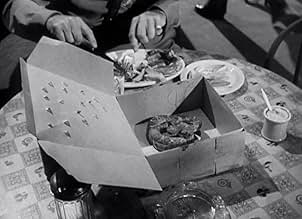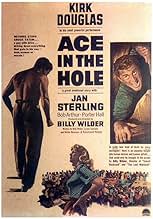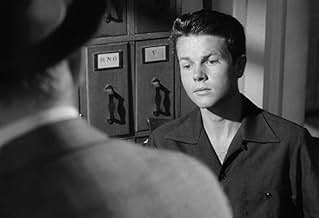Frustrated former journalist Chuck Tatum now working for an Albuquerque newspaper exploits a story about trading post owner Leo Minosa trapped in a cave to rekindle Chuck's career, but the s... Read allFrustrated former journalist Chuck Tatum now working for an Albuquerque newspaper exploits a story about trading post owner Leo Minosa trapped in a cave to rekindle Chuck's career, but the story soon escalates into a media circus.Frustrated former journalist Chuck Tatum now working for an Albuquerque newspaper exploits a story about trading post owner Leo Minosa trapped in a cave to rekindle Chuck's career, but the story soon escalates into a media circus.
- Nominated for 1 Oscar
- 5 wins & 3 nominations total
Robert Arthur
- Herbie Cook
- (as Bob Arthur)
Roy Regnier
- Nagel - New York Editor (replaced by Richard Gaines)
- (scenes deleted)
Oscar Belinda
- Barker
- (uncredited)
Featured reviews
10zinkster
One of Billy Wilder's great movies, with a superb acting job by Kirk Douglas as the cynical, glory-seeking and even desperate reporter whose only goal is get back in the limelight by regaining his former big-city news desk job.
The idea of such a newspaper reporter manipulating events to stretch out a story at the expense of and disregard for the victim still seems nearly inhuman, but Douglas' performance makes it instantly believable. The story scenario in which locals, then passers-by and finally distant tourists gravitate to and then make a festival or circus out of the event (the film was also released under the title "The Big Carnival") is supported by the real events on which the story was most likely based: the West VA mine disaster in 1925 that trapped miner Floyd Collins and was reported for 17 days, much as in the film, by local newspaperman Skeets Miller, who crawled into the mineshaft for face-to-face interviews with the trapped and doomed Collins.
This movie fits nicely into the Film Noir genre, although it takes place largely under the hot, harsh glare of the Arizona sun, highlighting the sweat and grime visible on the characters' skin and creating a visual metaphor for the sorry state of their souls. I wonder if Henri-Georges Clouzot saw this film before he began filming "The Wages of Fear," because the visually pervasive atmosphere of sweat and filth and opportunism are equally present in both.
The idea of such a newspaper reporter manipulating events to stretch out a story at the expense of and disregard for the victim still seems nearly inhuman, but Douglas' performance makes it instantly believable. The story scenario in which locals, then passers-by and finally distant tourists gravitate to and then make a festival or circus out of the event (the film was also released under the title "The Big Carnival") is supported by the real events on which the story was most likely based: the West VA mine disaster in 1925 that trapped miner Floyd Collins and was reported for 17 days, much as in the film, by local newspaperman Skeets Miller, who crawled into the mineshaft for face-to-face interviews with the trapped and doomed Collins.
This movie fits nicely into the Film Noir genre, although it takes place largely under the hot, harsh glare of the Arizona sun, highlighting the sweat and grime visible on the characters' skin and creating a visual metaphor for the sorry state of their souls. I wonder if Henri-Georges Clouzot saw this film before he began filming "The Wages of Fear," because the visually pervasive atmosphere of sweat and filth and opportunism are equally present in both.
There are some films that when you see them you ask why they aren't available to rent or own. This is one of them. I had the fortune of seeing this hidden gem on the big screen and was pleasantly surprised.
With Kirk Douglas playing a Reporter whose been around the block, always looking for a shortcut, comes across an opportunity to exploit a man caught in a mine shaft. I have read where critics had considered the circus atmosphere of the the film unrealistic. It seems Mr. Wilder got the last laugh. If you are interesting in great dialogue and good story telling, I suggest you find this
With Kirk Douglas playing a Reporter whose been around the block, always looking for a shortcut, comes across an opportunity to exploit a man caught in a mine shaft. I have read where critics had considered the circus atmosphere of the the film unrealistic. It seems Mr. Wilder got the last laugh. If you are interesting in great dialogue and good story telling, I suggest you find this
Billy Wilder's first commercial failure, but one of his best films, almost up there with "Sunset Blvd." Ambitious reporter Chuck Tatum (Kirk Douglas) finds out a man is trapped in a collapsed mine. By spewing out bogus engineering, he manages the rescue of the poor man to become more complicated, and time consuming then needed. Meanwhile, it becomes an amazing news item, something that makes Tatum the best known reporter in the country. However, everybody's luck runs out at the end. Perhaps the cause of failure of this film is that there are no sympathetic characters here. Douglas plays a total creep, the trapped man's wife is a floozy "I'm not going to pray for him! Praying ruins my nylons!" in the film. Even the trapped man is somebody who was poking around Indian graves. The screenplay, and the lead performances are top class. The extensive location photography, and somewhat documentary look of the film makes the film feel more modern than most 1951 films. Billy Wilder calls this film "the runt of his litter" Don't be so harsh, Billy, it's an excellent picture!
This is a movie I have loved since the first time I saw it as a child. Kirk Douglas plays the lead role in "The Big Carnival", or "Ace in the Hole" as it was originally titled. As down and out former ace newspaper reporter Chuck Tatum, he finds himself broke in the southwest and manages to talk himself into a reporting job with a small town newspaper. He and a cub photographer are sent to cover a snake hunt and on the way they come across a more interesting story. A man hunting Navaho artifacts got caught in a cave in.
Tatum, after visiting the man, Leo Minoso in the cave, has visions of Floyd Collins and a Pulitzer prize dancing in his head. Through blackmail and manipulation of the story, Tatum sells his soul and his journalistic ethics in his quest for a chance at the big time again.
This movie was ahead of it's time in estimating how low the media would go to sell a story. Tatum leads the carnival of onlookers, vendors and other reporters wanting a piece of the story until the inevitable tragic ending occurs. He realizes too late how he has turned a simple event into a tragedy and become part of the story instead of a reporter. Kirk Douglas turns in a powerful performance.
Tatum, after visiting the man, Leo Minoso in the cave, has visions of Floyd Collins and a Pulitzer prize dancing in his head. Through blackmail and manipulation of the story, Tatum sells his soul and his journalistic ethics in his quest for a chance at the big time again.
This movie was ahead of it's time in estimating how low the media would go to sell a story. Tatum leads the carnival of onlookers, vendors and other reporters wanting a piece of the story until the inevitable tragic ending occurs. He realizes too late how he has turned a simple event into a tragedy and become part of the story instead of a reporter. Kirk Douglas turns in a powerful performance.
Saw this films years ago and it's still gripping.Mr.Wilder seldom did films that gripped the human condition like this one.After this movie flopped he stuck to screen adaptions of stage hits through most of the fifties.Both director and star,Kirk Douglas really delivered a stinging expose of media hype and manipulation of the newspaper business.Herein,burned out reporter Douglas chances on a man trapped in a cave and ruthlessly exploits it for his own gain.There's no softness here,even the leading lady (played wonderfully by Jan Sterling)is as hard as Douglas.The scenes of all the gawkers showing up,complete with carnival,are outright creepy.There's even a cheesy country western singer plunking a guitar and singing about poor Leo,(the trapped man.) The only sympathetic person is poor Leo's mom who continually prays for his release.Definitely a film for lovers of great movie drama.
Did you know
- TriviaAfter the film was released, it got bad reviews and lost money. The studio, without Billy Wilder's permission, changed the title to "The Big Carnival" to increase the box office take of the film. It didn't work. On top of that, Wilder's next picture, Stalag 17 (1953), was a hit and he expected a share of the picture's profits. Paramount's accountants told him that since this picture lost money, the money it lost would be subtracted from the profits of "Stalag 17".
- GoofsWhen Lorraine and Chuck are talking out in front of Minosa's store by the gas pumps, reflections of the crew moving around behind the camera can be seen in the store windows.
- Quotes
Charles Tatum: Bad news sells best. Cause good news is no news.
- ConnectionsFeatured in AFI Life Achievement Award: A Tribute to Billy Wilder (1986)
- SoundtracksThe Hut-Sut Song
(uncredited)
Written by Leo Killion, Ted McMichael and Jack Owens
Sung by Richard Benedict and Kirk Douglas
Details
- Release date
- Country of origin
- Languages
- Also known as
- Cadenas de roca
- Filming locations
- Laguna Pueblo, New Mexico, USA(church exteriors)
- Production company
- See more company credits at IMDbPro
Box office
- Budget
- $1,800,000 (estimated)
- Gross worldwide
- $2,300,087
- Runtime
- 1h 51m(111 min)
- Color
- Aspect ratio
- 1.37 : 1
Contribute to this page
Suggest an edit or add missing content


